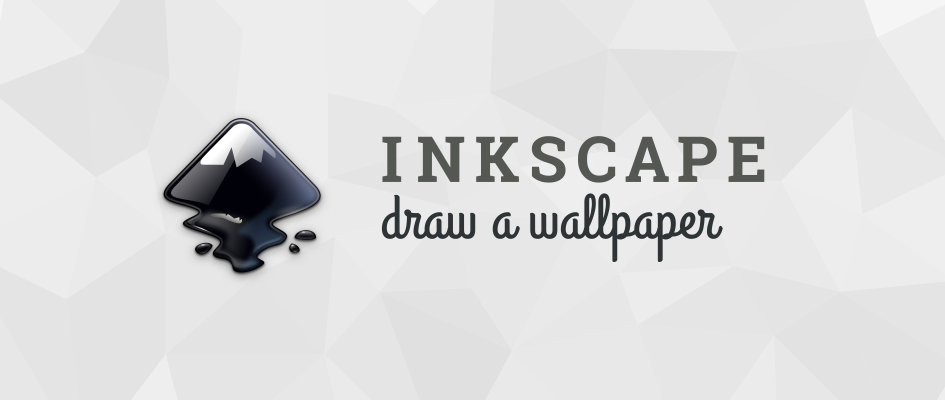mirror of
https://github.com/LCTT/TranslateProject.git
synced 2025-01-07 22:11:09 +08:00
130 lines
6.8 KiB
Markdown
130 lines
6.8 KiB
Markdown
### Create a simple wallpaper with Fedora and Inkscape
|
||
|
||

|
||
|
||
In our previous two Inkscape articles, we have [covered the basics of using Inkscape, creating objects,][18] and [doing some basic manipulations and color changes.][17]
|
||
|
||
In this next installment, we are going to put all these new skills together, and create our first composition — a simple wallpaper.
|
||
|
||
### Changing the document size
|
||
|
||
When going through the previous tutorials, you probably noticed the default document size shown on the main canvas window as a black bordered rectangle. The default document size in Inkscape is the A4 paper size:
|
||
|
||
[
|
||

|
||
][16]
|
||
|
||
For this wallpaper, we are going to resize the the document to **1024px x 768px**. To change the document size, Go to `File` > `Document Properties…` . In the Custom Size section of the Document Properties dialog, enter the width of 1024px, and a height of 768px:
|
||
|
||
[
|
||

|
||
][15]
|
||
|
||
The document outline on the page should now look something like this:
|
||
|
||
[
|
||

|
||
][14]
|
||
|
||
### Drawing the background
|
||
|
||
Next up, we are going to draw a rectangle as big as the document. So choose the using **rectangle tool, ** draw a rectangle, and adjust the size of the rectangle using the Tools Control bar.
|
||
|
||
[
|
||

|
||
][13]
|
||
|
||
Next up, add a Gradient Fill to the rectangle. [If you need a refresher on adding gradients, check out the previous adding colours article.][12]
|
||
|
||
[
|
||

|
||
][11]
|
||
|
||
Your rectangle might also have a stroke colour set. Use the fill and stroke dialog to set the stroke paint to **none**.
|
||
|
||
[
|
||

|
||
][10]
|
||
|
||
### Drawing the pattern
|
||
|
||
Next we are going to draw a triangle. Use the star / polygon tool with 3 points. You can** PRESS and HOLD DOWN CTRL** key, to give your triangle an angle and symmetry.
|
||
|
||
[
|
||

|
||
][9]
|
||
|
||
Select the triangle and press **CTRL+D**, to duplicate it (the duplicated figure will overlap the existing one), **so be sure to move it after duplicating.**
|
||
|
||
[
|
||

|
||
][8]
|
||
|
||
Select one of the triangles as shown, and go to **OBJECT > FLIP-HORIZONTAL**
|
||
|
||
[
|
||

|
||
][7][
|
||

|
||
][6]
|
||
|
||
Recolour your three triangles to three colors that look good with your background.
|
||
|
||
[
|
||

|
||
][5]
|
||
|
||
Select all your triangles, and duplicate them again to fill out your pattern:
|
||
|
||
[
|
||

|
||
][4]
|
||
|
||
### Exporting your background
|
||
|
||
Finally, we need to export our document as a PNG file. Open up the export dialog with** FILE > EXPORT PNG**, select the file location and name, make sure the Drawing tab is pressed, and click on **EXPORT**
|
||
|
||
[
|
||

|
||
][3]
|
||
|
||
Let no tool be a barrier to your imagination. Come up with beautiful wallpapers and submit the designs for [FEDORA 25 wallpapers][2]. Your design might get lucky enough to be used by thousands of Fedora users. Here are some examples of wallpapers created with Inkscape and the techniques above:
|
||
|
||
[
|
||

|
||
][1]
|
||

|
||
|
||
--------------------------------------------------------------------------------
|
||
|
||
via: https://fedoramagazine.org/inkscape-design-imagination/
|
||
|
||
作者:[a2batic][a]
|
||
|
||
译者:[译者ID](https://github.com/译者ID)
|
||
|
||
校对:[校对者ID](https://github.com/校对者ID)
|
||
|
||
本文由 [LCTT](https://github.com/LCTT/TranslateProject) 组织编译,[Linux中国](https://linux.cn/) 荣誉推出
|
||
|
||
[a]:http://a2batic.id.fedoraproject.org/
|
||
[1]:https://1504253206.rsc.cdn77.org/wp-content/uploads/2016/10/back1.png
|
||
[2]:https://fedoramagazine.org/keeping-fedora-beautiful-contribute-wallpaper/
|
||
[3]:https://1504253206.rsc.cdn77.org/wp-content/uploads/2016/10/Screenshot-from-2016-09-07-11-07-05-1.png
|
||
[4]:https://1504253206.rsc.cdn77.org/wp-content/uploads/2016/10/Screenshot-from-2016-09-07-10-49-25.png
|
||
[5]:https://1504253206.rsc.cdn77.org/wp-content/uploads/2016/10/Screenshot-from-2016-09-07-09-58-52.png
|
||
[6]:https://1504253206.rsc.cdn77.org/wp-content/uploads/2016/10/Screenshot-from-2016-09-07-09-57-42.png
|
||
[7]:https://1504253206.rsc.cdn77.org/wp-content/uploads/2016/10/Screenshot-from-2016-09-07-09-57-23.png
|
||
[8]:https://1504253206.rsc.cdn77.org/wp-content/uploads/2016/10/Screenshot-from-2016-09-07-10-44-01.png
|
||
[9]:https://1504253206.rsc.cdn77.org/wp-content/uploads/2016/10/Screenshot-from-2016-09-07-09-52-38.png
|
||
[10]:https://1504253206.rsc.cdn77.org/wp-content/uploads/2016/10/Screenshot-from-2016-09-07-09-44-15.png
|
||
[11]:https://1504253206.rsc.cdn77.org/wp-content/uploads/2016/10/Screenshot-from-2016-09-07-09-41-13.png
|
||
[12]:https://fedoramagazine.org/inkscape-adding-colour/
|
||
[13]:https://1504253206.rsc.cdn77.org/wp-content/uploads/2016/10/rect.png
|
||
[14]:https://1504253206.rsc.cdn77.org/wp-content/uploads/2016/10/Screenshot-from-2016-09-07-09-01-03.png
|
||
[15]:https://1504253206.rsc.cdn77.org/wp-content/uploads/2016/10/Screenshot-from-2016-09-07-09-00-00.png
|
||
[16]:https://1504253206.rsc.cdn77.org/wp-content/uploads/2016/10/Screenshot-from-2016-09-07-08-37-01.png
|
||
[17]:https://fedoramagazine.org/inkscape-adding-colour/
|
||
[18]:https://fedoramagazine.org/getting-started-inkscape-fedora/
|
||
[19]:https://fedoramagazine.org/inkscape-design-imagination/
|